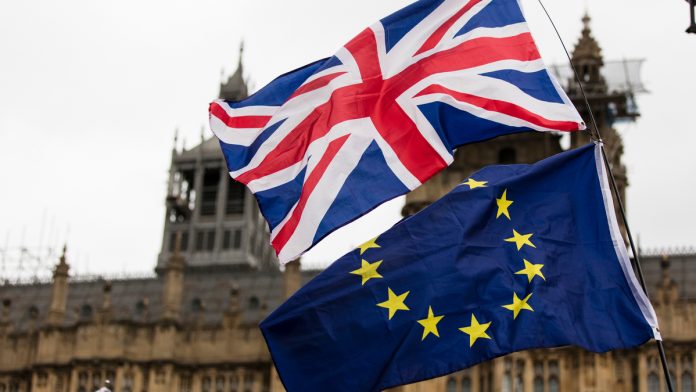- Pound (GBP) drops as UK government assumes there will be no trade deal with Europe
- UK public sector borrowing hit a record £128 million in 3 months to June
- Euro (EUR) supported by comments by ECB’s De Guindos who suggests that the downturn hasn’t been as bad as initially feared
- No high impacting data due for either side
The Pound Euro exchange rate (GBP/EUR) is extending losses for a second session on Wednesday. The pair settled -0.1% lower at €1.1051 on Tuesday after falling from a weekly high of €1.1111. At 05:15 UTC, GBP/EUR trades -0.1% at €1.1027, at the lower end of the daily traded range.
Brexit nerves are once again dragging on Sterling amid reports that the UK government is close to giving up hope of striking a post Brexit trade deal with the EU. The clock continues to tick towards the deadline of the end of July set by Boris Johnson.
The government is assuming that there will not be a deal and the UK and EU will trade on World Trade Organization terms when the transition period comes to an end of December 31st. Given that these terms are unfavourable the Pound is dropping.
Yesterday data showed that the UK net public sector borrowing surged to a record £128 billion in the three months to June, more than double the entire previous years’ borrowing as lock down restrictions were at their strictest. Economist are increasingly expecting borrowing in the UK this year to be its largest since World War 2, relative to the size of the economy
The Euro trended higher across the US session yesterday and continues on the front foot after European Central Bank policy maker De Guindos said that high frequency data indicates that the GDP contraction this year will be smaller than initially feared.
Investors cheered the comments, particularly as Eurozone data has been relatively upbeat in recent weeks and as any flare ups in covid outbreaks have been quickly brought under control
The Euro continues to be supported by news in the previous session that the EU leaders agreed on the EU recovery fund. Thus fund, through a combination of loans and grants will help those economies hardest hit by the coronavirus pandemic.
There is no significant data due from either the UK or the Eurozone leaving sentiment and political headlines to drive the pair.





